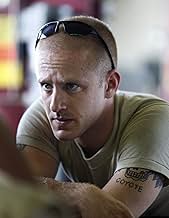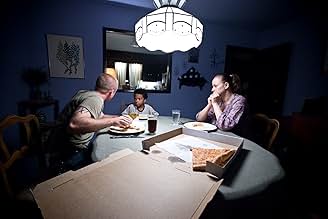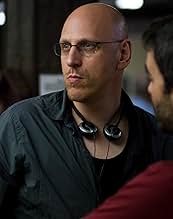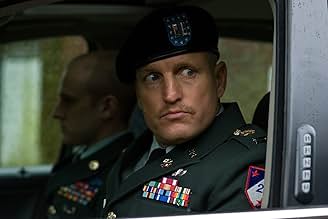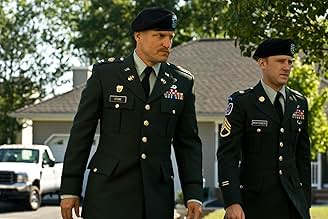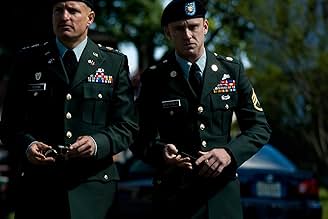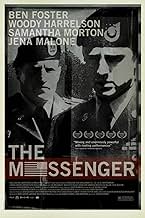NOTE IMDb
7,1/10
38 k
MA NOTE
Ajouter une intrigue dans votre langueAn American soldier struggles with an ethical dilemma when he becomes involved with a widow of a fallen officer.An American soldier struggles with an ethical dilemma when he becomes involved with a widow of a fallen officer.An American soldier struggles with an ethical dilemma when he becomes involved with a widow of a fallen officer.
- Réalisation
- Scénario
- Casting principal
- Nommé pour 2 Oscars
- 17 victoires et 47 nominations au total
Brian Adam DeJesus
- Teenager #1
- (as Brian DeJesus)
Avis à la une
After countless inert and strangely uninvolving films that have been released over the last few years and have used the war on terror as a backdrop for their action ("Jarhead," "Rendition," "Stop-Loss," more I can't even recall at the moment), 2009 produced two films that finally feel plugged directly into the tone the war has taken in our culture -- one of wearying sadness.
One of those films was "The Hurt Locker," and the other is "The Messenger," Oren Moverman's somber and haunting story about a troubled soldier back from the front lines who's assigned the task of notifying people about the deaths of their loved ones in the conflict. I can't vouch for the accuracy of either film, but I can say that both communicate the same emotions I feel when I see or hear first-hand accounts about what's going on overseas. I'm not enraged or galvanized into either pro or con positions -- I'm simply depressed by the meandering, pointlessness of it all and the human waste.
The acting trio of Ben Foster, Woody Harrelson, as Foster's instructor in how to be a harbinger of death and especially Samantha Morton, as the widow of one of the dead with whom Foster strikes up a romance of sorts, are formidable, and the film feels authentic in its settings and in the people who populate them. If you had to label the film one way or another, you would definitely have to come down on the side of anti-war. But it's really too resigned and matter-of-fact for that label to fit, and that's what I like about it. It almost seems to be saying that being anti-war is beside the point. Wars are always going to exist, and to be opposed to them is a waste of time. What's most troubling to think about are the innumerable number of lives that are going to be snuffed out because of them.
In a film filled with terrific scenes, the one that haunts me most is the one set in Morton's kitchen where she tells Foster about the relationship she shared with her dead husband. Filmed as one long take, the scene is mesmerizing, and Morton is so good I can't imagine how she managed to go overlooked at end-of-year awards time.
Grade: A
One of those films was "The Hurt Locker," and the other is "The Messenger," Oren Moverman's somber and haunting story about a troubled soldier back from the front lines who's assigned the task of notifying people about the deaths of their loved ones in the conflict. I can't vouch for the accuracy of either film, but I can say that both communicate the same emotions I feel when I see or hear first-hand accounts about what's going on overseas. I'm not enraged or galvanized into either pro or con positions -- I'm simply depressed by the meandering, pointlessness of it all and the human waste.
The acting trio of Ben Foster, Woody Harrelson, as Foster's instructor in how to be a harbinger of death and especially Samantha Morton, as the widow of one of the dead with whom Foster strikes up a romance of sorts, are formidable, and the film feels authentic in its settings and in the people who populate them. If you had to label the film one way or another, you would definitely have to come down on the side of anti-war. But it's really too resigned and matter-of-fact for that label to fit, and that's what I like about it. It almost seems to be saying that being anti-war is beside the point. Wars are always going to exist, and to be opposed to them is a waste of time. What's most troubling to think about are the innumerable number of lives that are going to be snuffed out because of them.
In a film filled with terrific scenes, the one that haunts me most is the one set in Morton's kitchen where she tells Foster about the relationship she shared with her dead husband. Filmed as one long take, the scene is mesmerizing, and Morton is so good I can't imagine how she managed to go overlooked at end-of-year awards time.
Grade: A
I was fortunate enough to see this at the recent NY Drama Critics showcase, where both the director (Mr. Moverman) and a co-star (Woody Harrelson) participated in after-show Q&A. First of all, the film is superb - but the summaries I've seen so far do not do justice to what the movie is really about. Sure there are ethical dilemmas, sure there are soldiers who have returned from Iraq. But the great strength of this film is its focus on individual human beings and their reaction to humans' most important concerns: life, death and love. Oren Moverman - accomplishing this so beautifully, accurately and subtly in a small-budget film - is to be congratulated. Woody Harrelson, Ben Foster and Samantha Morton are all magically on the same wavelength in their performances. And the writing (by Camon and Moverman) acknowledges the fact that reasonably intelligent people might be watching... people who don't need every little detail spelled out. Oh yes - I should mention that there's a lot of humor interspersed throughout. The result of all this? The people you meet in this film will stay with you for a very long time - and you'll be glad for that.
Another gloomy drama depicting what life is like when back home in wartime; this movie features some really great acting performances and a subject that resonates every time very powerfully. The plot hasn't been developed too much, as the story feels more focused on the characters, on their moody and attitudes/emotions. It's about a remarkable direction relying very much on the introspective work of the lead actors. Ben Foster is terrific as a man permanently on the edge, Woody Harrelson excellent as well as one who's crossed the edge already. Impressive is also the approach to heroism, without ever simplifying it and with a strong attention to the story-telling detail. And even though the plot takes a couple of contrived turns, there's a subtle, observant film-making about what's going on inside the characters for a change.
I saw The Messenger (as well as Oren Moverman and Ben Foster luckily) at the 2009 Philadelphia Film Festival and can say sincerely that I was captivated and moved by it for the majority of its runtime. No matter what your background or stance on the war, you need not worry because it is not a movie that attempts to have an opinion, but merely one that captures a different kind of war- one between civilians and the military, between following procedure and following what you believe.
In his last three months of service, Officer Will Montgomery (Ben Foster), is assigned to be a messenger to next-of-kins who have died in Iraq alongside the elder Lieutenant Anthony Stone (Woody Harrelson). He struggles with being the bearer of bad news to heartbroken parents and wives, delivering the messages to people of all ages, ethnicities, and social classes. His work becomes compromised, however, when complications with his girlfriend arise and he becomes involved with one of the widows, challenging his ethical and moral considerations. He plays the younger, more vulnerable to Harrelson's gruff, uncompromising, and often cold ethic.
The film is, in a word, compassionate, as it is almost entirely character-driven. The chemistry between Foster and Harrelson is incredible, demonstrating talent beyond the range of what one would expect for both actors. I would be very surprised if either one of these two were not nominated for an Academy Award. The cinematography is also very unusual, filmed in long takes, letting scenes unfold, rather than wide/medium/close- up/reverse formula, and heavily based on improvisation.
All in all, The Messenger is a touching story about the differences we can make in others' lives simply by being the right person to break the news and having an open heart. It's a tribute to the men and women in arms without letting political differences get in the way. A story of the war at home shared alike by civilians and military, it's hard not to feel emotionally affected.
In his last three months of service, Officer Will Montgomery (Ben Foster), is assigned to be a messenger to next-of-kins who have died in Iraq alongside the elder Lieutenant Anthony Stone (Woody Harrelson). He struggles with being the bearer of bad news to heartbroken parents and wives, delivering the messages to people of all ages, ethnicities, and social classes. His work becomes compromised, however, when complications with his girlfriend arise and he becomes involved with one of the widows, challenging his ethical and moral considerations. He plays the younger, more vulnerable to Harrelson's gruff, uncompromising, and often cold ethic.
The film is, in a word, compassionate, as it is almost entirely character-driven. The chemistry between Foster and Harrelson is incredible, demonstrating talent beyond the range of what one would expect for both actors. I would be very surprised if either one of these two were not nominated for an Academy Award. The cinematography is also very unusual, filmed in long takes, letting scenes unfold, rather than wide/medium/close- up/reverse formula, and heavily based on improvisation.
All in all, The Messenger is a touching story about the differences we can make in others' lives simply by being the right person to break the news and having an open heart. It's a tribute to the men and women in arms without letting political differences get in the way. A story of the war at home shared alike by civilians and military, it's hard not to feel emotionally affected.
The Messenger has incredible acting by Ben Foster, Woody Harrelson, and Samantha Morton.
The film has a curious flow to it. It begins predictable, yet remains engaging, exposing a heart-breaking consequence of war no family wants to face. Although the news remains the same, emotions run just as deep at each door. Every scene is handled marvelously through subtle performances by the actors. As the film unfolds, the viewer sinks into the complex characters on screen, discomforted by the internal struggles that slowly surface.
The Messenger is a non-linear, character-driven film with exceptional performances but might not be for everyone.
The film has a curious flow to it. It begins predictable, yet remains engaging, exposing a heart-breaking consequence of war no family wants to face. Although the news remains the same, emotions run just as deep at each door. Every scene is handled marvelously through subtle performances by the actors. As the film unfolds, the viewer sinks into the complex characters on screen, discomforted by the internal struggles that slowly surface.
The Messenger is a non-linear, character-driven film with exceptional performances but might not be for everyone.
Le saviez-vous
- AnecdotesThe scene where Will (Ben Foster) and Olivia (Samantha Morton) speak to each other in her kitchen is eight minutes long and was shot in one take. Co-writer and director Oren Moverman allowed actors and actresses to improvise in certain scenes.
- GaffesSeveral times throughout the movie, Captain Stone notifies next of kin of deceased soldiers without first getting positive confirmation that they are, in fact, the soldier's next of kin. Casualty Notification Officers are required to make sure that the person they are addressing is actually the next of kin before making notification. This is not a mistake that a professional like Captain Stone would make.
- Citations
Captain Tony Stone: [walking to deliver the news to a wife that her husband has died] It could be worse. It could be Christmas.
- Versions alternativesThere are two versions available. Runtimes are "1h 53m (113 min)" and "1h 45m (105 min) (Berlin International) (Germany)".
- ConnexionsFeatured in The Rotten Tomatoes Show: Zombieland/A Serious Man/Whip It (2009)
- Bandes originalesPut Your Hands Up
Performed by Plive (as P-Live)
Written by Christian Salyer, Isaiah Perkins
Published by Engine Co. 30/4tian Music/Engine Co. 35/4tian2 Music
Courtesy of 5 Alarm Music
Meilleurs choix
Connectez-vous pour évaluer et suivre la liste de favoris afin de recevoir des recommandations personnalisées
Détails
Box-office
- Budget
- 6 500 000 $US (estimé)
- Montant brut aux États-Unis et au Canada
- 1 109 660 $US
- Week-end de sortie aux États-Unis et au Canada
- 44 523 $US
- 15 nov. 2009
- Montant brut mondial
- 1 595 417 $US
- Durée1 heure 53 minutes
- Couleur
- Mixage
- Rapport de forme
- 2.35 : 1
Contribuer à cette page
Suggérer une modification ou ajouter du contenu manquant




